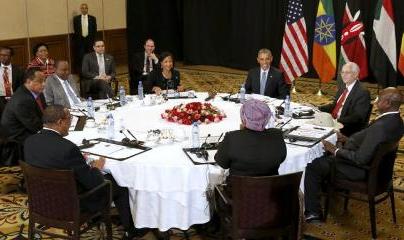Obama’s “aggressive” strategy could resolve S. Sudan crisis: report
August 12, 2015 (BOR) – Elites stalling South Sudan’s ongoing peace process ahead of the 17 August deadline set by regional mediators should face high level sanctions and asset seizures as part of United States president Barack Obama’s “Plan B” strategy, a new report said.

President Obama warned of grave consequences if South Sudan President Salva Kiir and rebel leader Riek Machar failed to sign a final peace agreement by Monday next week.
South Sudan’s information minister, Michael Makuei Lueth, told the state-owned SSTV they were yet to agree with the rebels on the proposed protocols of power sharing, security arrangement and allocations to government at national and states levels.
“We have not agreed on power sharing, the power of the powers of the president and what the rebels call first vice president. We have not agreed on the percentages whether at the national and states levels. With this, we cannot deceive ourselves that there will be peace”, he said.
During his recent visit to East Africa, President Obama said that if the two warring sides miss the deadline, “the international community must raise the costs of intransigence.”
“If they miss [the 17 August ], then I think it’s our view that it’s going to be necessary for us to move forward with a different plan and recognize that those leaders are incapable of creating the peace that is required,” he said during his visit to Addis Ababa, Ethiopia.
“More sanctions are part of the story, but the real game changer in South Sudan will be a transnational commitment to trace, seize and ideally return the billions that have been stolen from the South Sudanese people by their own leaders,” Akshaya Kumar,Sudan and South Sudan policy analyst at Enough Project said in the report.
“That money, and continued access to patronage networks, lies at the heart of elite motivations driving the ongoing conflict”, he added.
Obama’s Plan B strategy, Enough Project report stressed in its report, should involve high-level asset freezes and travel bans, a global arms embargo, and the prosecution of grand corruption and atrocity crimes, including natural resource pillage as a war crime.
John Prendergast, a director at Enough Project, said: “With each passing day it looks like a Plan B will be necessary in South Sudan. If August 17 passes by with no agreement, the US government should launch an aggressive diplomatic strategy at the UN Security Council to secure a global arms embargo and impose a second round of high-level sanctions designations against South Sudan’s leaders and their financial enablers”.
South Sudan’s warring factions have one last chance to end the country’s over 20-month civil war and sign a compromise agreement proposed by the Intergovernmental Authority on Development (IGAD) mediators facilitating the ongoing negotiations.
According to the report, pressure from President Obama and other world leaders at such a pivotal moment in negotiations has already set in motion the most serious peace deliberations to date.
“The United States must be prepared to take swift action on the promised Plan B should the parties once again fail to agree to and implement peace. The United States must follow through on the president’s strong words with equally strong action, both unilaterally and at the UN Security Council, where so far only six ground commanders —who hold little in the way of personal wealth or assets outside of South Sudan—have been designated for sanctions”, it further stressed.
STRENGTHEN REGIONAL EFFORTS
Building on efforts to tackle corruption and money laundering in the region, US should offer additional legal and technical support to improve regional sanctions enforcement.
“The US should prioritise programs that enhance the operational capacity of regional financial intelligence units to identify and freeze the assets of designated individuals,” says the report.
“The United States should also urge Kenya, Ethiopia, and Uganda to submit reports on their efforts to enforce UN sanctions as required by UN Security Council Resolution 2206,” it added.
REGIONAL PEACE PROJECTS
It said the US and Chinese governments should jointly review bilateral and multilateral funds earmarked for regional infrastructure projects in East Africa to assess the feasibility of additional investments given risks presented by South Sudan’s ongoing.
“This review should make clear that active regional sanctions enforcement will be considered a key risk mitigation factor”, reads the report extended to Sudan Tribune.
TACKLE CORRUPTION
President Obama should direct the US Department of State, the US Department of Homeland Security, and the FBI to provide inter-agency support to the US Department of Justice’s Kleptocracy Asset Recovery Initiative and focus on investigating instances of grand corruption in South Sudan, Enough Project urged in its newly-released missive.
“The US should also encourage Kenya, Ethiopia, and Uganda to actively contribute to global efforts to trace, seize, freeze, and return the proceeds of corruption to the people of South Sudan by sharing intelligence through the Asset Recovery Inter-Agency Network for Eastern Africa,” its report further recommended.
(ST)
